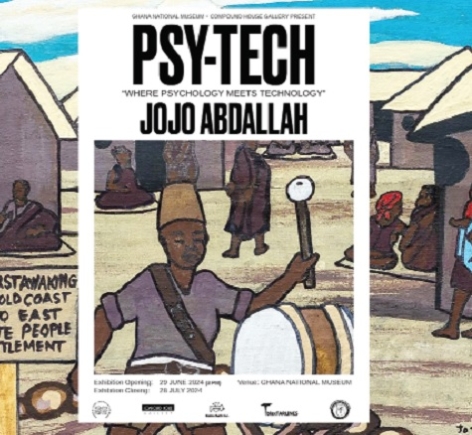
Your Ghana, My Ghana: Art for Healing and the enchanting world of painter Jojo Abdallah
Jojo Abdallah’s artistry transports us to an enchanting world where coiling leopards and mother mushrooms blend with global Ga traditional history and ceremonies, alongside cathedrals and good Samaritans, hospitals and ayaalolo buses.
Jojo’s surname Abdallah comes from his Lebanese grandfather, while his paternal grandmother is from Keta. His mother’s family is from Oda but Jojo grew up in Adabraka in Accra, immersed in Ga culture, and sees himself as a “citizen of Ga”.
Cathedrals and hospitals
Jojo's art studio, located in the Accra Psychiatric Hospital, has been his creative haven for 45 years. His paintings often feature cathedrals and hospitals, reflecting his surroundings and experiences.
Adabraka’s iconic Holy Spirit Cathedral is a major influence in Jojo Abdallah’s paintings, as are Korle Bu Teaching Hospital and the Accra Psychiatric Hospital at Asylum Down.
Through his art, Jojo Abdallah creates a vehicle for healing, exploring themes of psychology, technology, art, and science.
Psy-Tech
The Jojo Abdallah: Psy-Tech exhibition, a collaboration between Compound House Gallery, the Ghana Museums & Monuments Board, and Accra Psychiatric Hospital, showcases Jojo's unique blend of fantasy and reality.
This is the artist’s second solo exhibition at the National Museum of Ghana in two years. Psy-Tech is an abbreviation of Psychology and Technology. The name is taken from a signboard mounted by the artist at his art studio in the Occupational Therapy Department of the Psychiatric Hospital.
My first impressions of Jojo Abdallah came while he and curator Robin Riskin gave me a tour of the exhibition and Jojo explained his paintings. I was struck by his attention to detail, and by the Lewis Caroll-like quality of some of his explanations.

Mushrooming community
Like the subject of one of his best-known paintings, “Mother Mushroom”, which Jojo explains has birthed crops like yam, cocoyam, sweet potato and cassava, so Jojo’s work has attracted a growing community of creatives comprising musicians, artists, curators, designers, producers, photographers, writers, archivists and a doctor-philosopher.
And their association with Jojo has prompted the discovery of inner gifts. Take for example, Dr Enyin Bentum Paakow Annan. An early career medical doctor whose interest in philosophy led him to specialise in psychiatry, Dr Annan, known simply as Paakow, was introduced to Jojo Abdallah by Accra-based New Yorker Robin Riskin, the curator of Jojo’s current exhibition.
Riskin, who has known Abdallah for five years, was in turn introduced to the artist by musician Nii Noi Nortey, an mbira player and African multi-instrumentalist who has been holding weekly music sessions for children at the Accra Psychiatric Hospital for the past 10 years.
‘Galactic Guide’
Riskin’s “Galactic Guide” to the exhibition catalogue, itself a work of art, opens thus: “When I don’t know what to write, I listen. And what a world Jojo gives me to listen to. Flying squirrels, mothering mushrooms, Trojan horses from Persia, tigers named “Pappoeshieto”.
Besides reproductions of Jojo’s paintings themselves, Riskin has used the catalogue to create a community that populates the painter’s world with snatches of conversations and remarkable reflections on his work.
Genius and consciousness
Prompted by Riskin to write for the exhibition catalogue, Paakow produced his first poem, a compelling exploration titled Consciousness. “That which you and I have, but don’t share”, the doctor’s first line says. “Subjective lens, through which world makes sense”, the poem concludes.
Says celebrated creative, Panji Anoff, in one conversation, “On the journey to genius, people will call you a madman.”
From a medical point of view, “You can look at the brain but you cannot look at the mind. Not directly. The slow progress of psychiatry or psychology is partly due to this separation,” says doctor-philosopher Paakow.
Fiction and reality
In one conversation about the realness of Jojo’s work and his “idea of time and place”, Compound House director and artist, Nuna Adisenu-Doe, says:
“It’s fiction but it’s real fiction. For us, we might think it’s made up. But for him, it’s real.” To which Robin Riskin responds: “[A]rtists deal with fiction all the time.
Except Jojo actually lives this reality. He holds it to be true. ... If we can see how in Jojo’s apparent absurdity, there’s a supposed logic, it could help us wonder about the histories we hold to be so true.”
Jojo too has views on mental illness: “Mental people, when I study them, you will see that they are mentally affected. When you see them going home, you will see that they are shapes of mental.”
He is clear about his role at the Asylum Down hospital: “I am the Artist here. I print the Hospital’s bedsheets. I do their saucepans to be taken to the kitchen. I do signboards for them. I do everything. That is why they have given me all here, to do this plenty.”
One of Jojo’s comments in the catalogue confirmed my first impression of the artist. “The fact was that, when you water it with this magical medicated chemical, you pour it on the this-thing, before you realise, Alice and the Wonderful of the Magical Beans, it will grow-grow-grow, it will reach the top of the sun,” Jojo states in apparent reference to both Alice in Wonderland and Jack and the Beanstalk.
Complex themes
But beyond the fantastical, Jojo is interested in complex themes like the relationship between psychology, technology, art and science and the “occupatience of the art”.
“You know we are in the Occupation Department here? ... Occupation is the one who can give you that freedom to become any person you will like to be.
When they give you an occupation, you can become the person,” Jojo states. In addition: “If Psychological comes to see Biological aspect, it can broaden their mind to understand some vision of visual arts.”
Jojo makes trenchant observations about historical and contemporary trends: “In those days, Psychiatric stayed by the sea. These towns now have been destroyed by mansions.”
The artist often inserts his identity as signposts in his paintings, in much the same way that rappers today announce their names at their entrance to a song. Jojo told me that his favourite paintings are two titled “Jo-Nyame Working Home” and Jo-Hausa House”.
Communicating without words
“Jojo stands tall in art,” Paakow observes. “Envy engulfs me as I try but fail to understand his ability, which stands next to mine as a giant does to a dwarf. While I struggle for the words to communicate, he is able to communicate without words.”
After its current run at the National Museum of Ghana in Accra, the Jojo Abdallah: Psy-Tech exhibition will move to Tamale and Kumase, giving more people the opportunity to view this extraordinary body of work.
Join us on Graphic Online TV at 10am on Thursday for a conversation with Jojo Abdallah and members of his curatorial community.
Photos by Carl Segbefia. Courtesy of Compound House Gallery
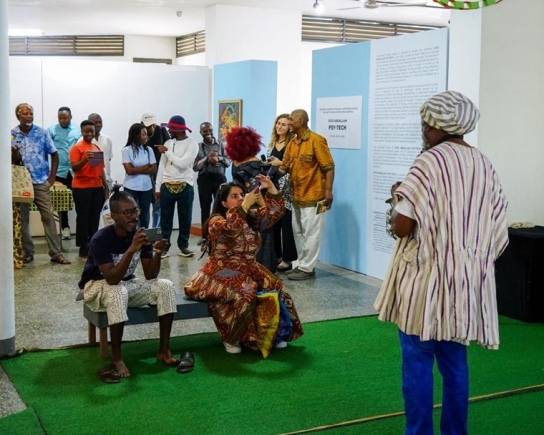
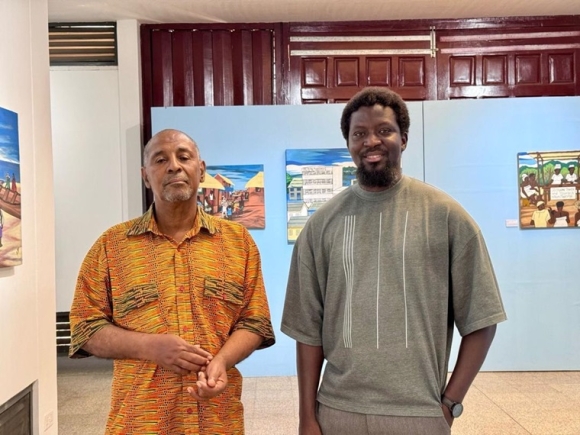
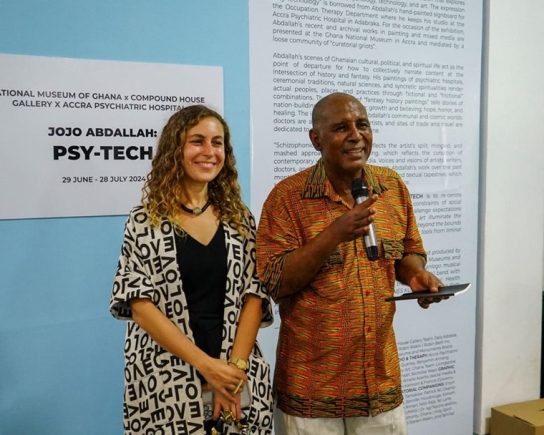
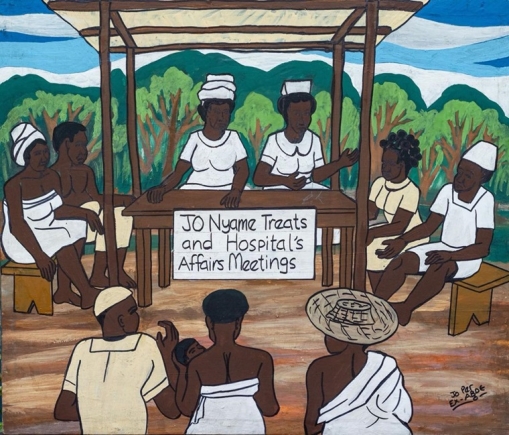
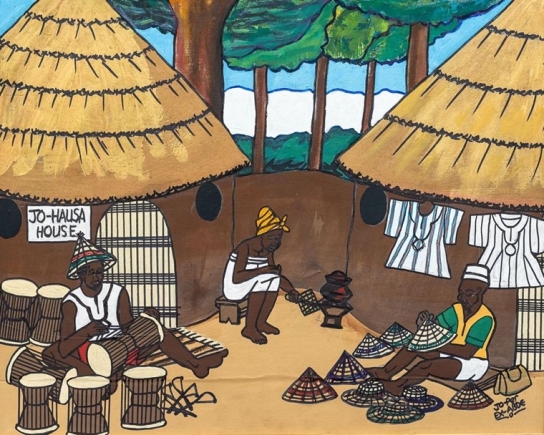
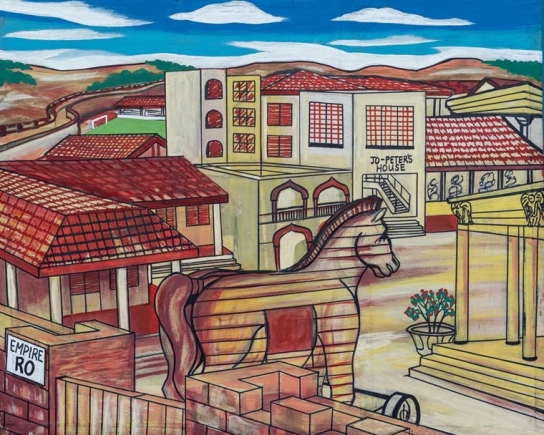
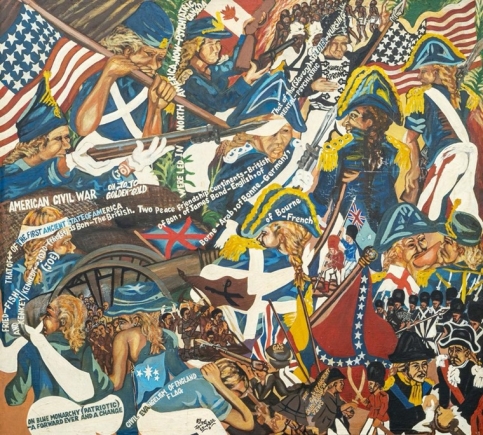
-------------
System Summary
Your Ghana, My Ghana: Art for Healing and the enchanting world of painter Jojo Abdallah
The article titled "Your Ghana, My Ghana: Art for Healing and the Enchanting World of Painter Jojo Abdallah" delves into the role of art in healing and the unique contributions of Ghanaian artist Jojo Abdallah.
It highlights how Abdallah’s vibrant paintings reflect Ghanaian culture and contribute to emotional and psychological healing.
The piece also discusses the impact of Abdallah’s art on community cultural pride and the broader significance of art in personal and collective recovery.
